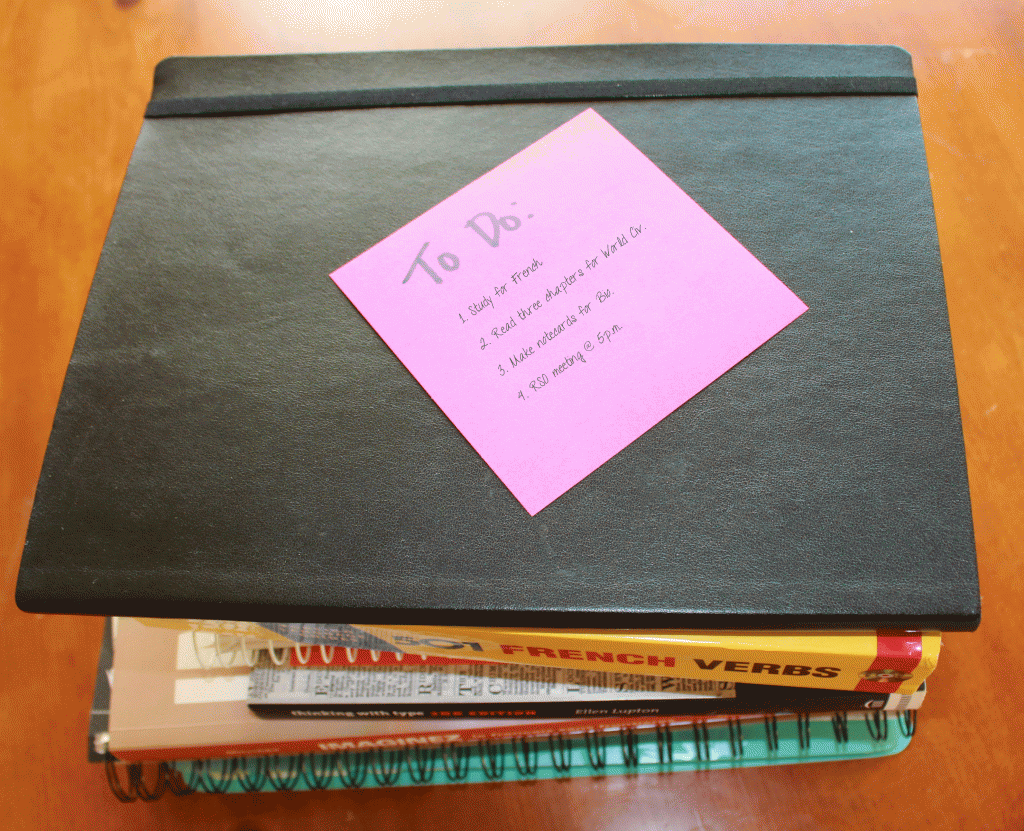I find sleep very important (I’d actually probably rank it above ice cream), and I’ve found that sleep tends to be a college student’s first sacrifice. My freshman year was mostly spent awake; I would spend hours into the pitch black of night writing papers due the next day, sorting through mountains of notecards for tests and all around fiddling with things I had to get done before sunrise. It didn’t occur to me until Christmas Break, when I slept for a zombie-like 16 hours at my parent’s house, that perhaps all this time spent nocturnal had taken a toll on my body, and even my mind. This drove me to start my next semester with a goal: Eight glorious hours of sleep a night. Surprisingly enough and despite popular belief, there are, in fact, enough hours in the day, depending on how you use them.
Get Out of Your Room
My room is awesome. I have a TV, iPod, laptop, a roommate who likes to tell me about her boy problems, and many other wonderful distractions. When I need to get stuff done, the first thing I do is leave. I head to Mullins if I need a sterile environment for memorizing facts, a moody coffee house if I need writing inspiration, the Honors College study room if I need a comfortable place to read a book, or random other nooks and crannies around campus.
Every Minute Counts
Although you might think that half an hour break in between classes is a perfect reason to pass out in a beanbag at Mullins, using that time to get something little done can put you to bed that much sooner. Blowing off time as “insignificantly short” can be the main reason for pushing all of those short homework assignments to 10 p.m. or later. Workbooks and written homework are perfectly tailored to fit into your 15- to 30-minute increments of spare time, like waiting for the bus or breaks between classes. With all of those small tasks out of the way, you can fully concentrate on studying in the evening and getting to bed before the sun rises.
Plan Ahead
The beautiful realization that studying can take place while enjoying a frappuccino will not only provide you with a relaxing environment in which to study, but even take the pressure off late-night studying – you’ll get a a grip on what is to come. Studying should take place days in advance. By making notecards after each class, you can skip the three hours it takes to scribble everything down the night before the test to an easy 15-minute activity (see above). Reinforce the material each day after that to ensure that you’ve memorized your notecards and understand everything written down. Tada! Your six hours of studying has just turned into one hour of reinforcement. As for essays, try tackling them weeks in advance. Harness your A+ inspiration by writing for 30-minute increments each day. Before you know it, 20 well-written and -planned pages are invigoratingly finished.
Down Time
It’s important to take some “me” time out of every day, but that doesn’t mean you need to be taking a four-hour nap when you get out of school. Power naps – sleeping for around 15-20 minutes – are an easy way to get a burst of energy (caffeine not included), without sacrificing your entire afternoon. Believe it or not, a study in 2000 showed that subjects completed a task more confidently after a 20-minute nap as opposed to sleeping an hour or more. Exercise is important too, but when do you have time? Lucky for UA students, the HPER offers group exercise classes at seemingly odd hours of the day: Sunrise Yoga is usually offered around 6 a.m. every day (remember you can wear sweat pants, comparable to pajamas). There are also 30-minute classes offered during lunchtime and throughout the afternoon. Then of course there are a few classes offered during the later evening. Conveniently, these are also the classes that have fewer participants, allowing you individual attention from the instructor.
Organize Yourself
Make a list or better yet, get a planner. This is one of the most important tips I can give you. Whether you purchase a Day Runner with 15-minute increments literally reminding you to breathe, or just scribble to-do lists on the back of scrap paper, being aware and having some tangible piece of evidence that says “you must do this today,” makes you entirely more likely to actually complete your to-do list. Take the time to organize yourself, and realize that you do have 12 plus hours to get everything done. Instead of fearing the mess of worries you have in your head, take the beast head-on: write down the stuff you’ve got to do and actually get everything (or almost everything) done. You’ll feel a weight lifted off your shoulders, and most importantly, beautifully de-stressed.

